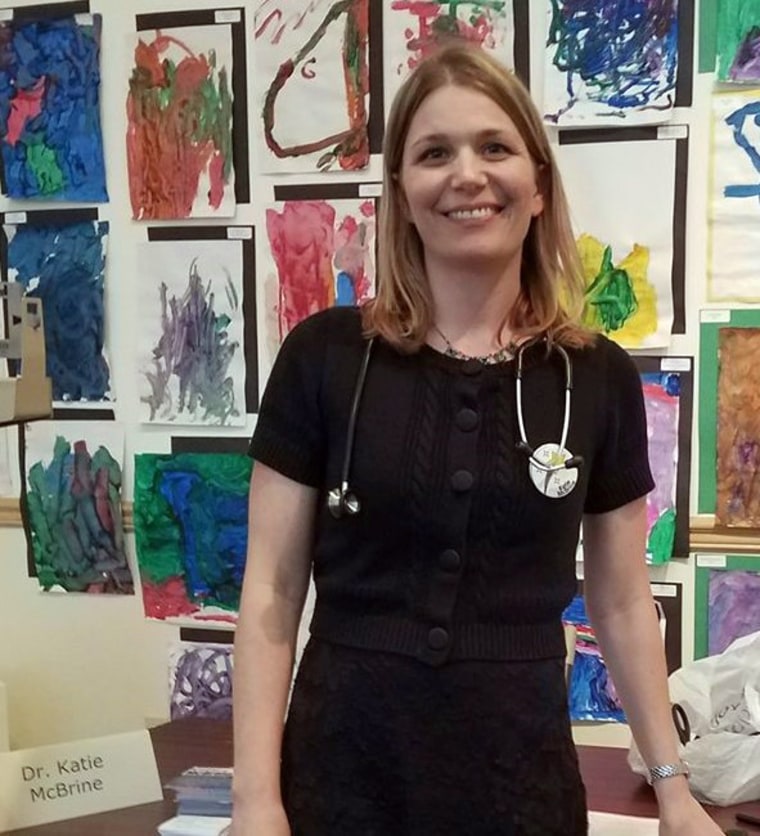Across the country, doctors' offices on the front lines of infant care are being forced to heavily ration how much baby formula they hand out amid a national supply shortage.
Pediatric and obstetrics and gynecology offices in several states contacted by NBC News shared similar experiences of desperate parents and caregivers asking for samples and being given a sparing amount.
"We used to be more open to giving them three, four, maybe even six cans of samples. We don't have that luxury anymore," said Katherine Isaza, an office manager at KidzCare Pediatrics in Charlotte, North Carolina, a city where the formula shortage has been particularly acute.
The office doesn't pick and choose which families it helps, Isaza added, but provides sample cans of Similac and Gerber products on a first-come, first-served basis. Such cans are often smaller than what's sold in stores.
Dr. Courtney Sauls, a pediatrician with health care provider Ascension St. John in Tulsa, Oklahoma, said her office hasn't been stocked up in a while. They must be choosy about who gets a sample, typically one or two cans of formula. The office, which serves a significant Medicaid and Indigenous population, will make samples primarily available for those who would need help from a local women, infants and children, or WIC, office, but may not have yet registered with them.
"This has been particularly challenging," Sauls said. "I empathize with all of my families trying to feed their babies."
In Facebook groups, frustrated families are sharing tips on what they’ve been doing, with some parents able to score formula through health clinics and charitable giveaways.
Hanna Collier, who lives near Panama City, Florida, was struggling in her search for formula for her 10-month-old son, Julian, who has food allergies. His regular provider had very little supply left, but then she learned of another office in Alabama that had samples of a special hypoallergenic brand made by PurAmino.
Last week, Collier drove about three hours roundtrip to procure 16 cans of the formula. But aware of the need, she decided to give away eight of them to other parents. She estimates she has enough to last a month before she’ll need to go on the hunt again.
“It’s already hard enough with gas prices going up to afford even making trips to get formula,” Collier said.
With the crisis becoming a political issue, the federal government on Thursday pledged that infant formula "should begin to see improvement" on store shelves "within days." The Biden administration announced it will compel suppliers to boost manufacturing and the Food and Drug Administration will streamline the ability of infant formula makers globally to sell their products in the U.S.
But that won't fix the problem immediately, which was exacerbated in February when the company Abbott Nutrition had to shutter a key manufacturing plant in Sturgis, Michigan, over suspected product contamination.
Surgeon General Vivek Murthy on Thursday urged families to exhaust their alternatives, including trying different brands of available formula or calling their doctors' offices for help.
At Nemours Children's Health, one of the largest pediatric multistate health systems in the U.S., primary care groups and other outpatient clinics have been getting hundreds of calls from parents concerned about the formula shortage, said Dr. James Franciosi, chief of gastroenterology, hepatology and nutrition at Nemours Children's Hospital in Orlando, Florida.
"They really have been overwhelmed with phone calls, and, you know, 'Please find this family the formula that they need,' and that's sometimes a hard thing to do," Franciosi said.
While most babies can tolerate substitutes for their regular brand of formula if their parents are able to get their hands on an equivalent, patients like his who are often medically complex or fragile do not always have that option, he added.
Doctors with enough supply to spare are also doing what they can.
In Scituate, Massachusetts, a coastal community south of Boston, Dr. Katie McBrine said her office has hundreds of various types of formula products on hand, and a local representative from Enfamil was able to "top us off." As a result, McBrine has been messaging with parents on Facebook who can stop by her home, where she leaves the formula in coolers at their convenience.
"My front porch is like a formula factory," McBrine said.

But it's not only families who don't realize that many doctors' offices will keep a stash of formula. In a Facebook group for doctors, McBrine said, some unaware physicians have asked how to help, and pediatricians such as herself have pointed out that there's plenty they can do because they have a clear line of contact with manufacturers.
In recent weeks, noticing the cupboard growing increasingly bare, McBrine said, she isn't giving away as many cans of formula as she might normally. And she's mindful to start every conversation she has with her families about whether they're in need.
"There's not anything I wouldn't do to help my families," she said.
Dr. KaraLin Root, a pediatrician at Southwest Children's Center in San Antonio, Texas, said her office is conserving formula samples for families with babies who have a difficult diet or aren't gaining weight normally.
In regular times, the office might generously dole out as many as a dozen cans. No longer. Meanwhile, she offers tips to families who need help, suggesting smaller pharmacies where product may be available as well as working with infants who are close to 1 years old to begin transitioning them to cow's milk or a milk alternative.
Her office had been on a two- to three-week delivery cycle of formula samples, Root said, but the supply is drying up and she wonders what will happen next in a community where many families count on Medicaid.
She lamented over the lack of replenished product: "We're not getting them at all."
